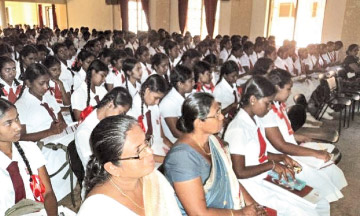Comprehensive understanding of jobs
M C Mathupala
|

A person going on a job search in the net
|
Career guidance programmes are conducted today in schools,
universities and other tertiary education institutions to help students
leaving such institutions to find employment. Most such activities focus
on the acquisition of qualifications for the jobs advertised in the
media and attempt to motivate the participating students to study
further and more efficiently. Some career guidance programmes –
especially in the private sector - concentrate on already employed
persons to progress in their careers vertically, and/or laterally
through career planning and understanding work styles and values.
Job seekers
Both these types of career guidance programmes are done in an ad hoc
basis and are to coordinated and use different approaches. The Foreign
Employment Bureau (FEB) has arranged to conduct similar training courses
for prospective seekers for jobs in foreign countries. The recently
drafted ‘National Human Resources and Employment Policy’ (NHREP) which
is to be presented to Parliament soon, has suggested the establishment
of a National Career Guidance Council ‘to be responsible for the
planning, development and supervision of how the national career
guidance plan of the country is implemented.’ This council will have
representatives of the public as well as the private sector.
The attempts made by the State as well as the private enterprises
indicate the importance of career guidance as a service to our youth
today. Most of our educated youth – particularly in the rural sector –
are engaged in ‘job searches’ than in ‘career searches’ or career
planning.
They keep on applying for ‘any’ job they presume they have the
necessary qualifications and feel frustrated when the responses are
negative. Career guidance helps them to understand the career options
available to them and how to choose a career. They should also help them
to match their personalities with the career options.
For this purpose the career/job seekers have to be helped to learn
about and understand themselves. They have to be assisted to identify
their skills and aptitudes in addition to what knowledge they have
gained through their academic qualifications. Certificates and degrees
are not the only indicators of suitability to handle a job efficiently
and successfully. Such understanding will help each of them to build a
‘personal and career portfolio’ which will indicate what other
capabilities have to be acquired by them to make them employable.
Self-employment
 |
|
Career guidance programme in a school |
 |
|
Some youth
working in the public sector |
Public sector jobs are the most attractive ones for the present day
youth. Perhaps they do not know about the hundreds of careers available
to them outside the public service. The majority of vacancies for jobs
advertised in the national newspapers is in the private sector. They may
also not be interested in the many opportunities for self-employment
available today if they have the entrepreneurship qualities.
They may not know about the facilities that can be used for assessing
oneself for the types of jobs available in the labour market today.
There are free assessment tests that can be accessed through the
internet to help them. The internet provides similar services to those
conducting career guidance programmes and career counseling sessions.
These facilities include lesson plans, job descriptions, career
biographies, career awareness information, methods of preparing for
given careers, preparing career interest inventories etc.
As there is a paucity of Labour Market Information Service (LMIS) in
Sri Lanka today, the services of the internet are a boon to the
prospective job seekers. The main source of information available is the
Quarterly Labour Force Survey (QLFS) published by the Department of
Census and Statistics.
Perhaps, the proposed Career Guidance Council will attempt to provide
more comprehensive information about the range of jobs available
(locally and abroad) in all the sectors for the benefit of future youth.
Choosing a career
|

An advertisement on job opportunities |
We should not forget the differently abled groups who are also termed
as ‘vulnerable or disabled persons.’It has been estimated that
approximately 7% of our population falls into this category. There are
institutions like the Schools for the Deaf and Blind helping them to
learn and a few NGOs helping such people to find jobs. They run training
courses and guidance programmes for the benefit of such groups. Yet, a
lot more has to be done in this area.
In order to help a person choose a career, she or he has to be given
sufficient knowledge about the main vocational fields where jobs are
available. There is no universally accepted list for this purpose. The
International Labour Organisation (ILO) has prepared a job
classification which is generally used in most countries.
Some of the main vocational fields in our country are (in
alphabetical order) Advertising; Agriculture; Animal Husbandry;
Archaeology; Architecture; Bakery trades; Building construction;
Business (commercial enterprises); Consultancy; Culinary jobs;
Draftsmanship; Education; Electronics; Engineering; Finance; Fisheries;
Health Services; Hospitality industry; Human Resources; Industrial
Production; Insurance; Journalism; Law Management; Marketing; Public
Relations; Secretariat Services; Security Services; Supply Management;
Technical Skills; Tourism; Training; and Veterinary Services. These
fields have many branches and sub-divisions which have to be
charted/mapped for the benefit of those being counseled.
In addition to the methods and processes that have to be followed in
finding a suitable job, the participants in career guidance programmes
have to be given a comprehensive understanding of the nature of such
jobs and the discipline that is required to retain a job once it is
found. This means that information like the tasks/activities that are
involved in performing the job; standards of performance expected (e.g
cost/quality/time/completion time/packing and other standards);
knowledge, skills and competencies that have to be acquired for progress
in the job and career, working environment (s); work ethics, styles and
values; wages and benefits that can be expected; human relations at the
workplace; other related occupations and places/ institutions where
training for such jobs/careers could be obtained have to be included in
the programmes. |







